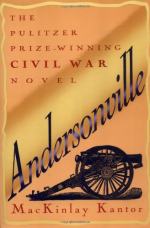It was our belief that every guard who killed a Yankee was rewarded with a thirty-day furlough. Mr. Frederick Holliger, now of Toledo, formerly a member of the Seventy-Second Ohio, and captured at Guntown, tells me, as his introduction to Andersonville life, that a few hours after his entry he went to the brook to get a drink, reached out too far, and was fired upon by the guard, who missed him, but killed another man and wounded a second. The other prisoners standing near then attacked him, and beat him nearly to death, for having drawn the fire of the guard.
Nothing could be more inexcusable than these murders. Whatever defense there might be for firing on men who touched the Dead Line in other parts of the prison, there could be none here. The men had no intention of escaping; they had no designs upon the Stockade; they were not leading any party to assail it. They were in every instance killed in the act of reaching out with their cups to dip up a little water.
CHAPTER XXIX.
Some distinction between soldierly duty and murder—A plot to escape —it is revealed and frustrated.
Let the reader understand that in any strictures I make I do not complain of the necessary hardships of war. I understood fully and accepted the conditions of a soldier’s career. My going into the field uniformed and armed implied an intention, at least, of killing, wounding, or capturing, some of the enemy. There was consequently no ground of complaint if I was, myself killed, wounded, or captured. If I did not want to take these chances I ought to stay at home. In the same way, I recognized the right of our captors or guards to take proper precautions to prevent our escape. I never questioned for an instant the right of a guard to fire upon those attempting to escape, and to kill them. Had I been posted over prisoners I should have had no compunction about shooting at those trying to get away, and consequently I could not blame the Rebels for doing the same thing. It was a matter of soldierly duty.
But not one of the men assassinated by the guards at Andersonville were trying to escape, nor could they have got away if not arrested by a bullet. In a majority of instances there was not even a transgression of a prison rule, and when there was such a transgression it was a mere harmless inadvertence. The slaying of every man there was a foul crime.
The most of this was done by very young boys; some of it by old men. The Twenty-Sixth Alabama and Fifty-Fifth Georgia, had guarded us since the opening of the prison, but now they were ordered to the field, and their places filled by the Georgia “Reserves,” an organization of boys under, and men over the military age. As General Grant aptly-phrased it, “They had robbed the cradle and the grave,” in forming these regiments. The boys, who had grown up from children since the war began, could not comprehend that a Yankee was a human being, or that it was any more wrongful to shoot one than to kill a mad dog. Their young imaginations had been inflamed with stories of the total depravity of the Unionists until they believed it was a meritorious thing to seize every opportunity to exterminate them.




